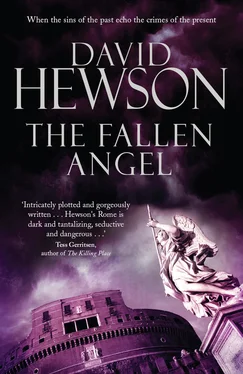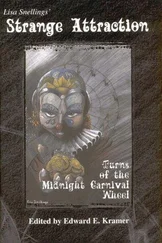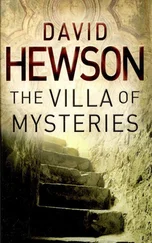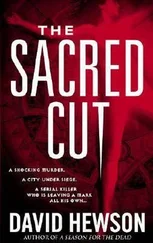David Hewson - The Fallen Angel
Здесь есть возможность читать онлайн «David Hewson - The Fallen Angel» весь текст электронной книги совершенно бесплатно (целиком полную версию без сокращений). В некоторых случаях можно слушать аудио, скачать через торрент в формате fb2 и присутствует краткое содержание. Жанр: Триллер, на английском языке. Описание произведения, (предисловие) а так же отзывы посетителей доступны на портале библиотеки ЛибКат.
- Название:The Fallen Angel
- Автор:
- Жанр:
- Год:неизвестен
- ISBN:нет данных
- Рейтинг книги:5 / 5. Голосов: 1
-
Избранное:Добавить в избранное
- Отзывы:
-
Ваша оценка:
- 100
- 1
- 2
- 3
- 4
- 5
The Fallen Angel: краткое содержание, описание и аннотация
Предлагаем к чтению аннотацию, описание, краткое содержание или предисловие (зависит от того, что написал сам автор книги «The Fallen Angel»). Если вы не нашли необходимую информацию о книге — напишите в комментариях, мы постараемся отыскать её.
The Fallen Angel — читать онлайн бесплатно полную книгу (весь текст) целиком
Ниже представлен текст книги, разбитый по страницам. Система сохранения места последней прочитанной страницы, позволяет с удобством читать онлайн бесплатно книгу «The Fallen Angel», без необходимости каждый раз заново искать на чём Вы остановились. Поставьте закладку, и сможете в любой момент перейти на страницу, на которой закончили чтение.
Интервал:
Закладка:
He climbed on, took great care to start it properly this time, then sat there with the little two-stroke engine rumbling happily as Peroni gripped his blue police crash helmet, standing to one side, staring at the machine, thinking.
‘The tyres are barely legal,’ he complained. ‘Does the horn work?’
Costa pressed it.
‘Sounds like an asthmatic duck. I could drown you in tickets right now.’
‘Only if you were a traffic cop. Which you’re not. Now get on, agente . And don’t squirm about back there. It may upset my balance.’
The scooter felt quite different with Peroni on the back. Costa navigated the piazza very carefully then headed for the ghetto. He couldn’t help notice Prinzivalli watching them leave, and that the man in uniform seemed to be shaking with laughter.
FIVE
Teresa Lupo walked out of the house in the Via Beatrice Cenci, glad of an excuse to get away from Falcone’s beady eyes, pushed her way through the barriers and the hordes of newspaper and TV reporters, then headed round to the little cafe in Portico d’Ottavia that Peroni had told her about. The search of the building was in good hands. Silvio Di Capua had his photographs. Slowly, steadily she was beginning to assemble some basic shreds of evidence. And one hour earlier she’d had the report from an outside specialist she’d brought in to take a look at the corpse of Malise Gabriel. It confirmed what she’d begun to suspect the day before. So she’d called Adriano Negri, the oncologist who’d brushed off Di Capua’s inquiries, and made it clear she wanted to see him, immediately.
He was waiting in the cafe already. Teresa kissed him on both cheeks then got a couple of slices of Jewish pizza for them both.
‘Is this healthy?’ asked Negri, a handsome man in his late thirties, tall with a distinguished academic face and long, dark hair.
‘How many sick Jews have you seen lately?’
‘Quite a few.’
‘Not through eating this stuff.’ She smiled at him from across the table. ‘You look well.’
‘Thanks. You too. I hear you’re. . settled.’
‘Settled?’
‘With a cop. An old cop.’
She took a bite of the pastry and wondered why they’d never discovered this stuff before.
‘The man I love,’ Teresa said. ‘That’s how it’s supposed to be, isn’t it?’
‘You could have been choosy.’ He hesitated. She could still picture him twenty years before, at La Sapienza, the university where they first met. He had long hair then, money and a wonderful if unconvincing smile. ‘Maybe even me.’
‘You know, it was the constant presence of that “maybe” that was the problem, I think. Also, I am choosy.’
He shrugged, in that exaggerated way, with the downturned mouth, that had always annoyed her.
‘But a cop. An old cop. .’
‘Malise Gabriel,’ she interrupted.
‘Can’t talk patients.’
‘He’s a dead patient. Probably a dead murdered patient.’
‘That doesn’t. .’
‘Actually, it does make a difference. Legally, ethically, morally. If you withhold valuable information from us it would be inexcusable. Possibly rather difficult too, were I to make it so.’
‘Don’t threaten. .’
‘Malise Gabriel was suffering from pancreatic cancer. I know he saw you several times. I need to understand his condition. If there’s anything else you can tell me. .’
The consultant drained his coffee and tried a little of the pastry. He was a decent-enough man. Arrogant, self-obsessed, destined to be single probably. But a talented doctor, one who wanted to help people.
‘Am I to be quoted?’ he asked.
‘This is just a private conversation between the two of us, Adriano. If it came to a court case I can bring in an expert witness instead. Save me some time now, please. I will be grateful.’
He didn’t look happy. But she watched the way he squirmed and knew she’d won.
‘It was diagnosed when he was living in America,’ Negri said. ‘The insurance wouldn’t cover him over there. I suspect that’s one reason he came to Rome. He thought because he had a UK passport-’
‘That he was covered? He was, surely?’
Negri shrugged and said, ‘If only it were that simple. There are rules about residency. Malise hadn’t lived in Europe for two decades or more. He was effectively stateless, at least as far as medical insurance was concerned. I did what I could for a while. He found money from somewhere. At first, I assumed paying for treatment wasn’t a problem. He had a manner about him. Aristocratic. A little overbearing. One didn’t wish to ask. But. .’ He seemed embarrassed. ‘Treating a disease like that is extraordinarily expensive if you have to pay yourself. A few weeks ago he told me he had no more money left. Or rather no way of finding more. It didn’t come from him. He always paid cash, very large sums sometimes. I didn’t pry.’
This puzzled her.
‘Do many private patients pay cash?’
He was squirming again.
‘No. Generally speaking only the ones from Naples or Sicily, if you know what I mean.’
Crooks, she thought, not that he wanted to say it.
‘I tried to find funds for him,’ Negri went on. ‘I suggested he approach his academic colleagues for support, but that was beneath him. I’m sorry.’
‘Are you telling me a dying man was refused treatment because he had no money?’
‘You sound surprised. Why? Oh yes. Now I remember. You haven’t worked in medicine for years, have you? That’s the regime we have now. Every last thing costed, justified, analysed. Ten years ago I would have treated Malise Gabriel to the best of my ability without a second thought, knowing that someone, somewhere would have picked up the bill. Not today. We live in mean times. Mean in spirit. Mean in other ways too. I’m sorry. I couldn’t treat him any longer. Even if I waived my charges, someone would have to pay for the rest of the treatment and there was no one. So I had to tell him it was at an end. Not that I could have made much difference to his condition anyway.’
‘How long did he have?’ she asked.
‘I would guess six months. A year at most. Possibly less. Untreated, it’s difficult to tell.’ He laughed, without mirth or feeling. ‘You know the ridiculous thing? I’d arranged for him to enter a hospice for palliative care close to the end. Getting money to keep him alive was impossible. Finding some altruistic sisters of mercy who would ease his suffering — I had a dozen to choose from.’
He looked so mournful she felt guilty.
‘You know who he was?’ she asked.
‘You mean the books? Of course.’
‘He’d have gone into a church hospice?’
‘You’d be amazed how many rediscover God at the end,’ Adriano Negri said. ‘The pain, the fear.’ He thought for a moment. ‘Not that I saw much of that in Malise. He was a remarkably easy patient, if I’m honest. A strong man. Opinionated. Angry, not about himself, I think, but about others. A terminal disease can manifest itself this way sometimes. The sick take it out on the healthy, as if they’re to blame somehow. I can’t imagine Malise would have been easy to deal with at home.’
‘You’ve seen the news?’
‘I’d rather not think about it.’
‘Did you meet his wife?’
‘No. The girl came with him once or twice. Sat in the waiting room. Pretty kid.’
His eyes didn’t leave her.
‘Well?’ she asked.
‘They seemed very close. Not like father and daughter.’
‘Like what then?’
‘Friends,’ he said after a while. Then he drained his coffee. ‘Are we finished here? I have patients to see.’
Negri had been at La Sapienza the year the then-Cardinal Ratzinger had visited. He was as incensed as everyone else about the statements that had been made, the implication that somehow a scientist like Galileo had deserved his treatment at the hands of the Vatican.
Читать дальшеИнтервал:
Закладка:
Похожие книги на «The Fallen Angel»
Представляем Вашему вниманию похожие книги на «The Fallen Angel» списком для выбора. Мы отобрали схожую по названию и смыслу литературу в надежде предоставить читателям больше вариантов отыскать новые, интересные, ещё непрочитанные произведения.
Обсуждение, отзывы о книге «The Fallen Angel» и просто собственные мнения читателей. Оставьте ваши комментарии, напишите, что Вы думаете о произведении, его смысле или главных героях. Укажите что конкретно понравилось, а что нет, и почему Вы так считаете.











